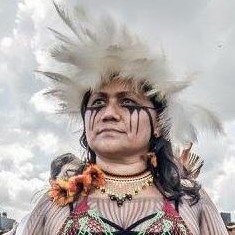Indigenous Mobilization Wins Battle in President Bolsonaro’s War on Indigenous Peoples
His extremist policies have earned Brazilian President Jair Bolsonaro the nickname “Tropical Trump”, but his plan to shift indigenous protection to the agribusiness-aligned Ministry of Environment has been shot down by opposition leaders and the country’s Supreme Court.

This story first appeared on the EDF blog
6 May 2019 | Far-right Brazilian President Jair Bolsonaro’s personal crusade to extinguish indigenous rights and devastate indigenous territories just hit a wall. Two, actually. Both Brazil’s Supreme Court and Brazil’s top congressional leaders handed Bolsonaro setbacks over his executive decision to move control of protecting indigenous lands to the agriculture ministry, which is controlled by members of the agribusiness lobby known for its opposition to indigenous land rights.
Taken together, this means that Bolsonaro’s signature action to start the rollback of indigenous territories and declare open season on Amazon deforestation – which needs both congressional and judicial approval to fly – looks to be crashing on takeoff. It’s also a glimmer of hope for indigenous and environmental protections in a country now led by a president openly hostile to Brazil’s indigenous peoples and Amazon rainforest – repositories of its vast social and biological diversity, and key to stabilizing the global climate.
Supreme Court rules government is responsible for protecting indigenous lands
On its first day in office, the Bolsonaro administration decided in executive action MP 870 to remove the authority to legally recognize and physically demarcate indigenous lands from the National Indian Foundation (FUNAI) and give it to the Ministry of Agriculture, Ranching and Supply (MAPA). MAPA is controlled by politicians affiliated with the anti-indigenous agriculture caucus of the congress bent on expanding their lands into the rainforests that belong to indigenous communities. Destroying these rainforests will have devastating effects not only for indigenous communities, but for the world’s climate.
In his April 23rd ruling on a suit against MP 870 by the Federal Attorney General’s Office, Brazilian Supreme Court Justice Luiz Roberto Barroso found that while the court could not rule on the way the executive branch chose to organize itself, the government’s responsibility to demarcate and protect the indigenous territories is clearly articulated in the 1988 Constitution.
“This responsibility is not discretionary . . . and is not subject to political preferences. . .The Federal Government is obligated to carry out these demarcations, and refusal to do so would effectively imply unconstitutional behavior,” said Justice Barroso. Failure to advance the demarcation of indigenous territories would then be subject to judicial intervention.
The Supreme Court has repeatedly upheld indigenous peoples’ constitutional rights to the lands they traditionally occupied and the government’s responsibility to demarcate them and guarantee the indigenous peoples control over their resources – often in the face of intense political opposition from states, landowners and industry. Last year, the court also upheld the constitutional land rights of slave-descended communities (quilombos) over vehement political opposition from large landowners.
The decision means that, while the executive can in principle vest any agency it likes with authority to demarcate indigenous territories and guarantee indigenous people control over their resources, these are legal obligations. If the executive doesn’t act, the door is open for indigenous peoples to take it to court.
Congressional leaders side with indigenous leaders
Leaders of the “Free Land” Encampment that brought more than 4,000 indigenous people to Brasilia and leaders of the Parliamentary Front in Defense of Indigenous Rights last week met with Brazil’s top two congressional leaders. Both congressional leaders committed to reverse MP 870, which requires congressional support to remain in force. With both presidents opposed, it’s unlikely to get the support it would need.
Both Rodrigo Maia, president of Brazil’s Chamber of Deputies, and Davi Alcolumbre, president of the Senate, also concurred with the indigenous leaders’ demand that FUNAI be returned to its prior position under the authority of the Justice Ministry. MP 870 had subordinated FUNAI to the Ministry of Women, Family and Human Rights – presided by an extreme right-wing evangelical fundamentalist. Both Maia and Alcolumbre belong to the right-wing Democratic Party (DEM), part of Bolsonaro’s congressional coalition. Their siding with indigenous people is a clear sign of the Free Land Movement’s success.
Congresswoman Joênia Wapichana (Rede, Roraima), coordinator of the Parliamentary Front in Defense of Indigenous Rights and the first indigenous woman member of Congress, said, “This shows that the Congressmen understand that there was a de-structuring . . . that makes the demarcation of indigenous lands inviable.”
Public opinion, political position, and what’s next
Political leaders know public opinion in Brazil overwhelmingly supports indigenous rights – the Bolsonaro clan’s views notwithstanding. Even politicians not vaguely known for supporting indigenous rights know this.
DEM members of Congress on the other hand are historically as enthusiastic about indigenous rights as Republicans in the US Congress are for gun control. They can however read their Twitter feeds, and know that the massive indigenous mobilization was widely covered nationally and internationally, and that Brazil’s image on the global stage is affected by its indigenous policies – for better or for worse. They also know that the views of the Agriculture Caucus on indigenous rights are in a very small minority in Brazil. Large majoritiesof Brazilians don’t support Bolsonaro on indigenous rights.
Even though the Brazilian people support indigenous rights, powerful elites and demagogues like Bolsonaro will continue their crusade against them. Indigenous peoples are the most effective guardians of the forest, and warriors against climate change. That’s why it’s critical that we continue to support the indigenous resistance.
This is far from the first or only moment when politicians and others have, like Bolsonaro, predicted or promoted the end, or the disappearance, of the indigenous peoples. It’s also not first time that indigenous resistance has proved them wrong. It won’t be the last.
Please see our Reprint Guidelines for details on republishing our articles.

